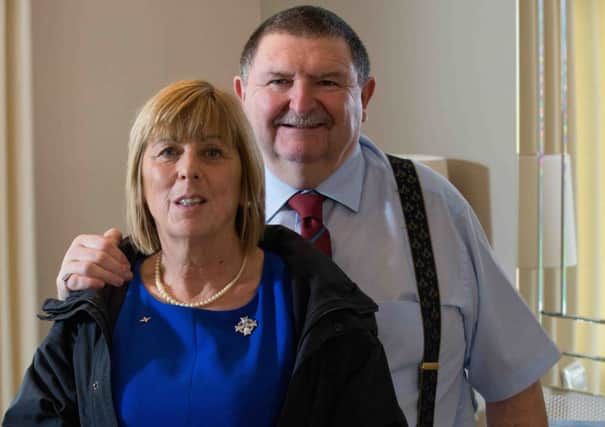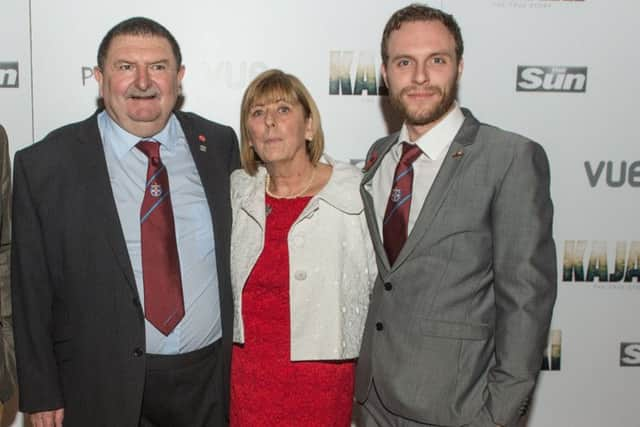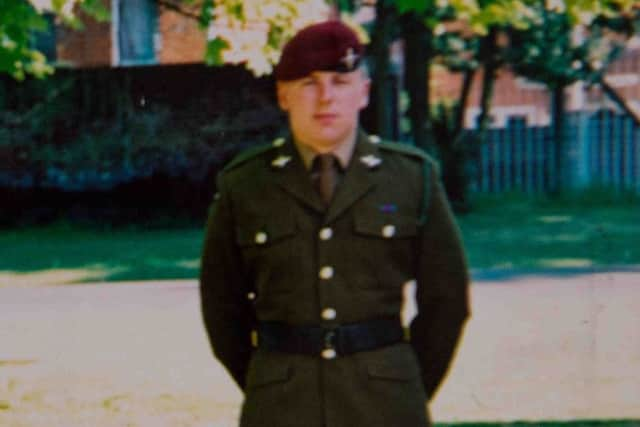Mark Wright’s parents share memories of hero son


Eight years on and that moment, as well as the build-up to it and the aftermath, has been captured for posterity in a new film – Kajaki – which was screened in the Capital last night.
To Bob and Jem Wright though, Mark’s life was made of the many moments that they now desperately cling to in remembrance: the first time he cried, which brought an end to their decade-long painful wait for a baby; the first time he rode a bike; his first school photo, white-blonde hair neatly combed, looking smart in his Prestonfield Primary blazer. The first time he told them he was going to join the “n’army”.
Advertisement
Hide AdAdvertisement
Hide AdThen there were the days he helped in the hairdressing salon beside his mum, his attempts to follow in his dad’s footsteps and become a painter and decorator, his army training and all the washing he would bring home at weekends from his Colchester base, his personalised PARA numberplate of which, as a member of 3 Para, he was so proud.


None of these moments will ever appear on screen but they replay in their heads on a daily basis.
There are others which they can only imagine as they are stories passed to them by those he served with – his split-second decision to call off a mortar strike as he had spotted Afghan children walking towards the target. How he was so skilled he could hit a 5p piece with a mortar and how, when he lay dying nearly 4000 miles from home, he asked that his fellow soldiers tell his fiancée she should meet someone else and have a happy life.
Finally there are the moments that will never happen – his planned wedding at the Minto Hotel, grandchildren, whether or not he’d have joined the SAS as he’d so hoped.
Perhaps it’s no wonder that neither Bob or Jem have been able to watch the film of Mark’s dying moments, a film which has been described as “scrupulously realistic” and “painfully tense”.


Sitting in their immaculate home on the outskirts of Dalkeith – they moved there from their family home in Lady Road after Mark died – the couple are surrounded by mementoes of their son’s bravery.
Duplicates of his medals are framed on the wall, along with a citation from the Queen and photos of the day they went to Buckingham Palace to receive their son’s posthumous George Cross. They still have Mark’s maroon Para beret and his helmet. Jem admits that she still wears one of his old North Face anoraks and sometimes even an old pair of his jeans. They are physical reminders to hold on to alongside the memories.
“We’re not a military family,” says Jem, who was 55 when Mark died. “The idea of a career in the army was never something that was automatic for Mark. But when he was about three he used to say to me when he was big he’d join the n’army,” she smiles. “My brother joined up when Mark was seven and we’d go to Hereford to visit so he’d see the camps, so maybe it did influence him.
Advertisement
Hide AdAdvertisement
Hide Ad“When he did join up he was 19. I think I always knew he would, though I spent two days crying. He knew his mind and even though so many people said to me ‘tell him not to do it’ you can’t tell someone how to live their life.”
Given what 3 Para faced in Helmand it’s no wonder Jem cried about what fate might have in store for Mark.
The regiment was the first British unit to be sent to the Afghan province in 2006, and with just 1200 soldiers held a disparate number of areas against relentless attack. Undermanned and lacking resources, they were stretched to breaking point. The ferocity of the fighting led to the awarding of 32 gallantry medals.
And then there was the Kajaki Dam. The men had been stationed there for a while and had spotted an illegal roadblock. A patrol went out to look and Stuart Hale, one of Mark’s fellow Para’s stepped on an old Soviet landmine, which blew his leg off. As Mark and others tried to assist him, they realised they were in the middle of a minefield.
Bob, 67, says: “He knew it was dangerous but it was what he wanted to do. He liked the camaraderie of it. He was a kind, caring guy and he thought he was doing good – making a difference. He tried to do that till the end.”
Pinned to Jem’s blue dress is Mark’s Elizabeth Cross, awarded to soldiers killed while on active service, as well as his Parachute Regiment badge. His George Cross and other medals are on loan to the Scottish War Museum.
“He had it on his jacket,” she says, of his Para badge. “And I still wear one of his jackets. It’s got a rip in the pockets and he tried to repair it himself, so I hide it with my bag. I also wear a pair of his jeans. I still feel as if he’s going to come home.”
Jem was at home on her own on September 6, 2006 when she heard that her son had been killed. “I was just in from work and Bob went out to do a job estimate but he’d told me that he’d heard there had been an accident and so many soldiers were injured.
Advertisement
Hide AdAdvertisement
Hide Ad“I thought I’d watch the news to find out and when they said someone had been killed I had a gut feeling that Mark was hurt. That was about ten to six – at 6pm the door went and there were two soldiers standing there.
“They asked if I was Mrs Wright and if they could come in. I said only if they were there to tell me Mark was still alive.”
Bob adds: “I got a phone call from Jem screaming, telling me to come home. When I got back there were two guys in uniform standing in the living room and Jem was on the floor. It was like I was in a daze.”
The Wrights, who are both now retired, admit that it’s hard for them to believe that day was eight years ago. “It’s still like it was yesterday sometimes,” says Jem. “You do live with it. It doesn’t go away but you manage. We’re fine during the day because we’re busy doing things, but at night when we go to bed that’s it. We still don’t really sleep.”
Mark was born on April 22, 1979, to the couple who had been together since their late teens. “He was 9lb 10, the biggest baby in the hospital,” she smiles. “We waited nearly ten years for him. We loved him so much.”
She adds: “Everybody loved him because he was so gentle. I ran a children’s nursery and the kids there used to love him when he came in to visit. He was always happy, always had a smile on his face.”
There has been charity work to help them focus. They helped establish the Mark Wright Project, set up to help veterans find homes and help with post-traumatic stress disorder, but after a variety of problems they are no longer involved and the charity no longer uses Mark’s name. Jem has also taken part in a skydive for the Afghanistan Trust set up by Col Stuart Tootal, former commander of 3 Para.
“I was terrified, but it was good to feel a bit of what Mark must have felt,” she says.
Advertisement
Hide AdAdvertisement
Hide AdNow there’s the film. “It got a standing ovation in London last week,” says Bob. “I went in to watch but I had to come out. It was too difficult. Afterwards I saw a lot of people who had seen it and they were crying.
“Jeremy Clarkson was there and said it was the best war film he’d ever seen, and there was no fighting in it.”
Jem has never watched it either. “They [the producers] did ask us if we wanted to see it at home, but we said no. My brother Alex has seen it though and said it was really good.
“We’re going to the Omni Centre to support the cast, but we won’t be watching it. The way Bobby explains it is that in years to come this film will be like the black and white ones that are on TV now – something that happened years ago – but it will keep his name alive.”
Bob adds: “The chap [David Elliot] who plays him in the film, he’s been here to see us a couple of times, he’s a nice guy. Right at the beginning when they asked us what we thought about a film and if we would give them our permission, they also spoke to some of Mark’s friends to find out what he was like outside the army.
“People ask if it [Mark’s death] was worth it, but how can it be when the job is still not done out there? People are still dying, our people but so many Iraqis and Afghans, it’s so terrible. He said Iraq was a walk in the park compared to Afghanistan.
“When he’d hear the families of soldiers who’d been killed talking on TV saying that it wasn’t worth it, he’d say ‘never say that mum, we’re out there trying to do good, it is worth it’,” says Jem. “We have to believe that. And I believe we will see him again.”
• Kajaki: The True Story goes on general release from November 28